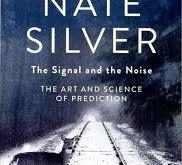The origins of MMT Many mainstream economists seem to think the idea behind Modern Monetary Theory is new and originates from economic cranks. New? Cranks? How about reading one of the great founders of neoclassical economics – Knut Wicksell. This is what Wicksell wrote in 1898 on ‘pure credit systems’ in Interest and Prices (Geldzins und Güterpreise), 1936 (1898), p. 68f: It is possible to go even further. There is no real need for any money at all if a...
Read More »The hazards of willfully ignoring uncertainty
The hazards of willfully ignoring uncertainty We forget – or willfully ignore – that our models are simplifications of the world … One of the pervasive risks that we face in the information age … is that even if the amount of knowledge in the world is increasing, the gap between what we know and what we think we know may be widening. This syndrome is often associated with very precise-seeming predictions that are not at all accurate … This is like claiming...
Read More »Milton Friedman’s pet theory finally shown to be wrong
Milton Friedman’s pet theory finally shown to be wrong Milton Friedman’s Permanent Income Hypothesis (PIH) says that people’s consumption isn’t affected by short-term fluctuations in incomes since people only spend more money when they think that their life-time incomes change. Believing Friedman is right, mainstream economists have for decades argued that Keynesian fiscal policies therefore are ineffectual. As shown over and over again for the last three...
Read More »Successive approximations
In The World in the Model Mary Morgan characterizes the modelling tradition of economics as one concerned with “thin men acting in small worlds” and writes: Strangely perhaps, the most obvious element in the inference gap for models … lies in the validity of any inference between two such different media – forward from the real world to the artificial world of the mathematical model and back again from the model experiment to the real material of the economic world. The model...
Read More »Trump and free trade
Trump and free trade Dear President Trump, Plenty of people will try to convince you that globalization and free trade could benefit everyone, if only the gains were more fairly shared … This belief is shared by almost all politicians in both parties, and it’s an article of faith for the economics profession. You are right to reject it … It’s a fallacy based on a fantasy, and it has been ever since David Ricardo dreamed up the idea of “Comparative Advantage...
Read More »Poverty — the Dumb and Dumber version
Poverty — the Dumb and Dumber version A few years ago, two economics professors, Quamrul Ashraf and Oded Galor, published a paper, “The ‘Out of Africa’ Hypothesis, Human Genetic Diversity, and Comparative Economic Development,” that drew inferences about poverty and genetics based on a statistical pattern … When the paper by Ashraf and Galor came out, I criticized it from a statistical perspective, questioning what I considered its overreach in making...
Read More »Economism and Economics
By James Kwak One point I try to be clear about in my new book is that economism—the assumption that simple Economics 101 models accurately describe the real world—is not the same as economics. There are people who think that all of economics, or at least all of modern, mathematically inclined, “neoclassical” economics, is at fault for the growth of neoliberal capitalism and the increase in inequality in rich countries. I am not one of them. In my mind, the problem is knowing just a...
Read More »Economism and Economics
By James Kwak One point I try to be clear about in my new book is that economism—the assumption that simple Economics 101 models accurately describe the real world—is not the same as economics. There are people who think that all of economics, or at least all of modern, mathematically inclined, “neoclassical” economics, is at fault for the growth of neoliberal capitalism and the increase in inequality in rich countries. I am not one of them. In my mind, the problem is knowing just a...
Read More »Public debt and economic growth
Public debt and economic growth Towering debts, rapidly rising taxes, constant and expensive wars, a debt burden surpassing 200% of GDP. What are the chances that a country with such characteristics would grow rapidly? Almost anyone would probably say ‘none’. And yet, these are exactly the conditions under which the Industrial Revolution took place in Britain. Britain’s government debt went from 5% of GDP in 1700 to over 200% in 1820, it fought a war in one...
Read More »The golden rule of public debt
The golden rule of public debt Nation states borrow to provide public capital: For example, rail networks, road systems, airports and bridges. These are examples of large expenditure items that are more efficiently provided by government than by private companies. The benefits of public capital expenditures are enjoyed not only by the current generation of people, who must sacrifice consumption to pay for them, but also by future generations who will travel...
Read More » Heterodox
Heterodox








